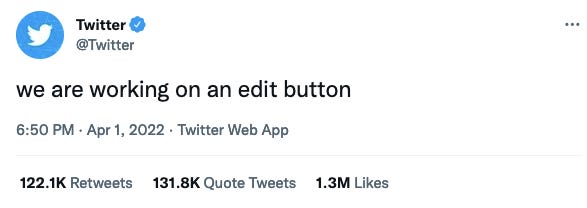Spend enough time on Twitter and everything you say becomes ironical, semi-serious, deniable; so it made sense that the debate over whether Twitter should have an edit button was reignited with a tweet on April Fool’s day.
The topic became both more and less serious when it emerged that Elon Musk had become the site’s biggest shareholder and was plotting a takeover bid.
Some people seem to think that adding an edit button is trivially easy.
Some people just want one full stop.
What they don't seem to realise that there are a huge number of design decisions and engineering challenges involved in making a change like this. You have to choose whether to create a history of the edits and whether a retweet of the original tweet also changes. Having edits limited by time or numbers of characters would create its own frustrations, especially if you are one second or one character out.
This is not to say that editing posts on social media is impossible. You could just implement the same system as Facebook:
To which Musk replied:
Musk is right: Twitter is not Facebook. Twitter is more like a hybrid of a text message and a blog post. The closer it is to one, the less it will be like the other — and you can't edit text messages on other people's devices. Making typos is part of the danger of being alive and maybe this jeopardy is what makes Twitter exciting.
Whenever I see debates like this my mind lights up. I try to understand the perspective of the engineers who have to deal with the consequences of supposedly simple decisions. Then I try to think through the potential changes to the ecosystem. For those analytical people who lack the wit and ambition to write fiction, thinking about trade-offs can be a good substitute.
This mode of thinking is rather addictive and leads to what we might call the trade-off mindset — where you cannot see any situation without thinking about the trade-offs, possibly leading to an inability to make any radical change.
For instance, the trade-off mindset can’t help but pick apart people’s bold political rhetoric. The other day Claire Biddles was outraged at an open return to Leeds costing £360.
Because I was bored on the train I thought I'd be a helpful citizen and see what was going on. Turns out that £360 is the price of a first class open return, which may well be the only suggested fare if all the standard fares had sold out, but there seemed to be plenty of singles at around £61. Claire knew all this but was making a broader point about how expensive fares can be.
I understand that outrage helps change minds, but couldn’t help thinking through the trade-offs. Current rail pricing, whilst way too high overall, deals with supply and demand pretty well. Advanced tickets are cheaper, encouraging people to plan ahead. Standard tickets are capped, but there can still be cheaper tickets available for empty trains. Maybe first class shouldn’t exist at all, but I like the idea that it helps subsidise other tickets. Also, we can't put on unlimited trains that are empty most of the time just to deal with the occasional surge, so inevitably there will be trains that are fully booked. Adjusting all these dials and levers to reach an acceptable compromise is the best we can hope for.
But what about your principles? How much do you have to compromise them to get a job? I was thinking about this after reading this tweet from Dickon Edwards, who was complaining about the indignity of having to be on LinkedIn.
I agree that LinkedIn is no place to be and am lucky enough that my freelance life means I don't have to worry about such things. But I can see that, from an employer's perspective, LinkedIn is a useful tool that provides social proof that you are a good, collegial worker. Moreover, it offers evidence that you are willing to dance the strange dance of modern life, which is sadly a pre-requisite for most bullshit jobs.
Nevertheless, when you are obsessed with trade-offs it can obscure what is valuable. This interview between Richard Madeley and the climate activist, Miranda Whelehan, shows what happens when you only see trade-offs and are blind to how the destruction of the environment might make all of your concerns pale into insignificance.

As you can see here with Richard Madeley, the trade-off mindset becomes a mental habit that makes change seem impossible. We become advocates for the status quo because we can't see past the myriad of potential problems when anything changes.
Even something as stark as the Russian invasion of Ukraine has people defending it based on the idea that there are trade-offs usually mentioning the Azov battalion and NATO encroachment. And, of course, Germany is utterly dependent on Russia for energy, helping to inadvertently fund the invasion. Should the Germans have to have cold showers to potentially save a Ukranian life? The ethical absolutist might say that it is the right thing, according to moral law, to save a life. The utilitarian might weigh up the number of lives across a period of time and the relative impact of each choice before making a decision.
Thinking about trade-offs is fun and we can spend all day doing it, but the world is full of Machiavellians:
“It is better to be impetuous than cautious, because Fortune is a woman, and […] it is clear that she more often allows herself to be won over by impetuous men than by those who proceed coldly.”
Niccolò Machiavelli, The Prince
Ultimately, we cannot know the future so all our utilitarian projections of different trade-offs are uncertain. It is into this zone of uncertainty where our values must take over.












